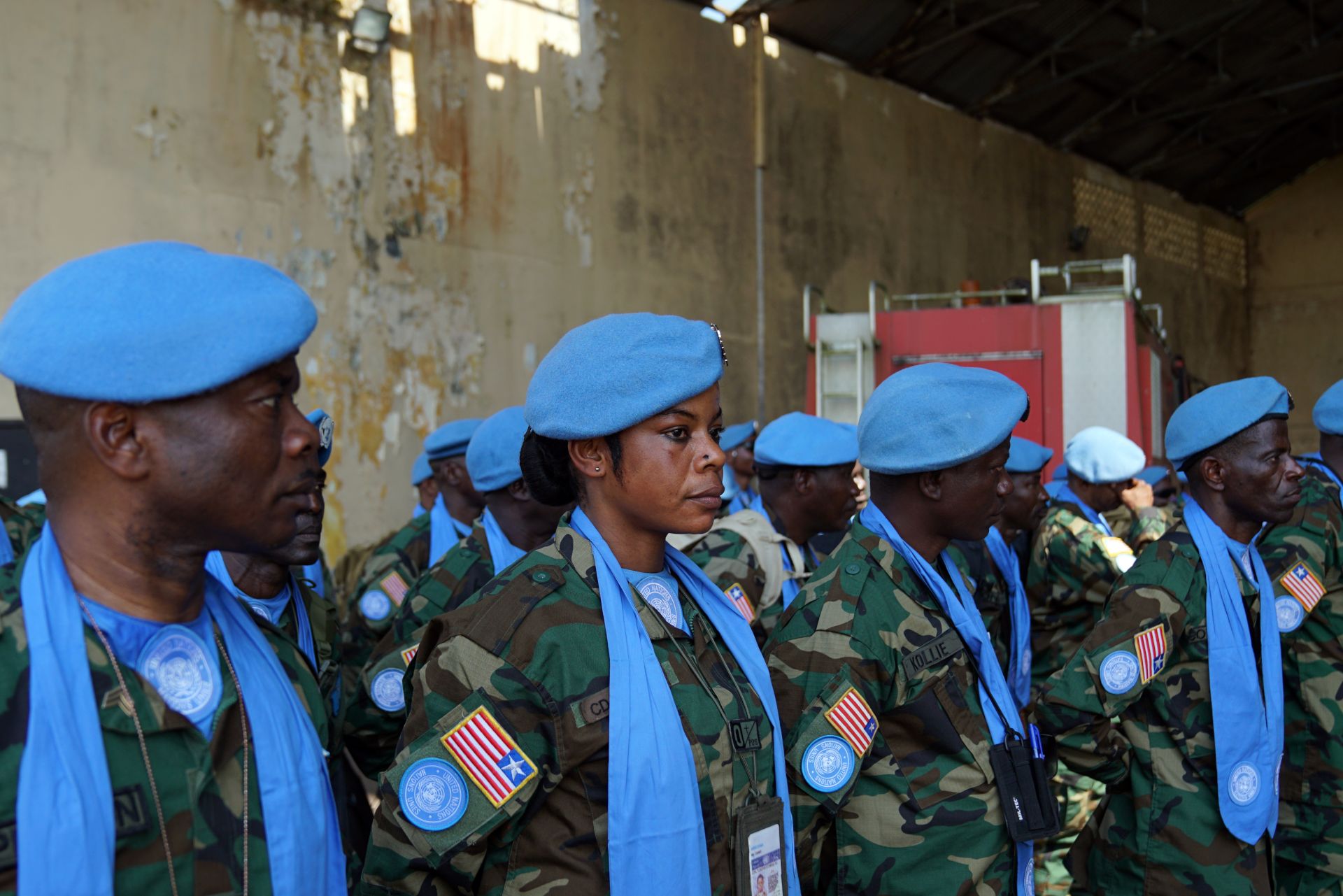On the morning of May 3, 2017, Sgt. Ethel Y. Nelson was cutting okra in a kitchen of the United Nations “super camp” in Timbuktu, Mali, when mortars suddenly rained down. The Liberian peacekeeper strapped on her body armor, picked up her AK-47 and headed to a designated bunker to count soldiers and civilian staff.
“It was scary, it was shocking, and I had no option but to take action,” she told New Lines.
Nelson, who had been on the base since 2016, had experienced rocket fire coming from Islamist insurgents before, but this was the first time any had landed in the Liberian section of the massive compound, which hosted troops from all over the world. She found a colleague bleeding and tied a tourniquet around their arm. Reinforcements were sent to the guard towers, and soldiers scrambled to rescue their comrades from the burning containers where they lived.
One Liberian soldier was killed instantly, while others were injured. One was paralyzed and died years later from a shrapnel wound that would not heal. For Nelson, who had only experienced war as a civilian back home in Liberia, it was her first taste of combat as a soldier. “I gained braveness, to be brave as a soldier, because I saw a real-life scenario,” she told New Lines, while also expressing sadness about the loss of a colleague.
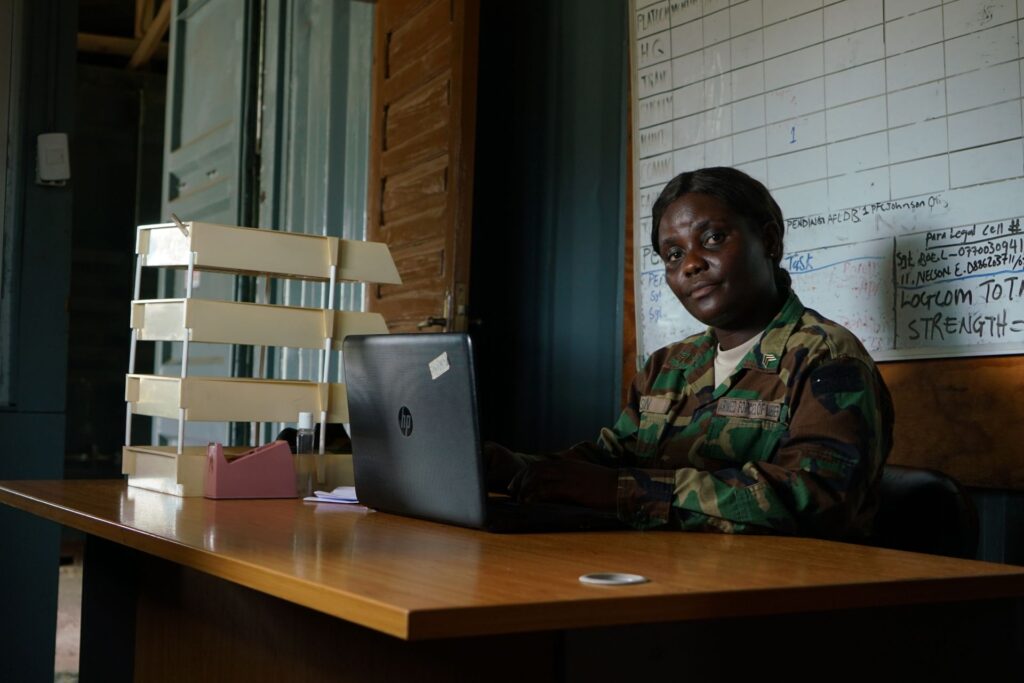
In 2013, the U.N. authorized the deployment of the Multidimensional Integrated Stabilization Mission in Mali (MINUSMA) as a response to growing insecurity after key towns in the north and center of the country were overtaken by armed groups of Tuareg rebels and Islamists following a coup in 2012. Nelson, whose country, Liberia, was once home to one of the world’s largest peacekeeping missions, is among the 800 soldiers — almost half of Liberia’s standing force — who were deployed to the mission from 2013 till its closure this month.
U.N. peacekeepers come from national armies the world over, but the bulk of troops come from poorer countries, like Liberia, which deployed a modest company of 150 men and women in rotation to Mali. Since the early 2000s, Western nations have sent fewer and fewer peacekeepers, with the bulk of their troops deployed as part of coalition-led wars in the global war on terror after 9/11.
High U.N. salaries, coupled with the broader advantages for often-underfunded armies, offer strong incentives for low-income countries like Liberia and benefits for individuals like Nelson. However, these benefits come with high risks, especially on dangerous missions as in Mali. Critics suggest that via U.N. peacekeeping, poorer soldiers shoulder the danger in some of the world’s deadliest conflicts, while Western states, particularly the U.S., foot the bill.
For thousands of African peacekeepers, the winding-down of MINUSMA is the end of a grinding mission that was one of the deadliest in U.N. history — more than 300 troops were killed and over 85% of those fatalities were African. But it also marks the end of an opportunity to gain upward economic, social and career mobility that for many, particularly those from nations with small armies and weak economies like Liberia’s, was life-changing. Over the course of two years, we interviewed dozens of Liberian peacekeeping troops about their experiences in Mali — what they gained and at what cost — and heard what was at stake for them as the mission ended.
Mali is one of the central countries of the Sahel, a strip of nations that border the Sahara. The region has been embroiled for the past decade in a deadly mix of rising Islamist insurgencies, internal political strife and climate change, which has led to devastating instability and conflict. Following Mali’s 2012 coup, the rapid advance of Islamist and Tuareg armed groups surprised and alarmed many, both domestically and internationally. As the security situation deteriorated, France sent a military mission to help the Malian government troops push rebel forces back north, and the U.N. established peacekeeping bases at sites of instability across the country, but the violence continued.
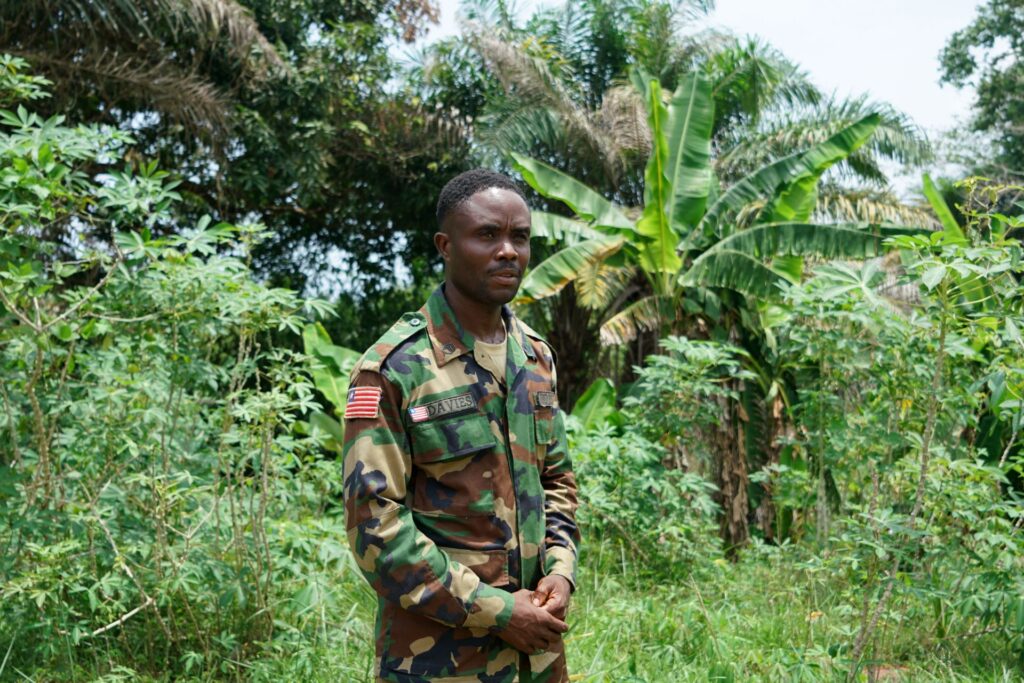
Eddie Namu Davies, like many Liberian children who grew up during the country’s civil war in the 1990s, was no stranger to gunfire and acts of brutality committed by men, women and children both in and out of uniform. Despite that, he joined the army in 2007 and more than a decade later accepted a posting at MINUSMA.
“In school I had read about Mansa Musa,” he said, referring to the legendary Malian king from the 14th century who was believed by many to have been the richest man in the world. “But never in my mind did I expect to go there.”
For Davies, a history and news buff, serving on a U.N. mission in another country opened a whole new world: exposure to an international organization and foreign peacekeepers, to a new country and culture, and to a conflict that was different from the brutal war fought by rebel factions back home. It was also a way of giving back to a system that had served Liberia; in 2003, 14 years of conflict had left its people traumatized and its infrastructure shattered before thousands of peacekeepers helped to stabilize the country. But the realities of life on the ground in Mali were a departure from what he had observed of the U.N. mission to Liberia a decade earlier.
“I had seen U.N. camps here [in Liberia] and thought it would be like that,” Davies said. “I didn’t expect so many attacks — they can happen day and night. I slept with my gun beside me.”
The peacekeepers in Mali had a broad mandate, including supporting stabilization efforts, protecting local civilians and helping put into place a failed peace agreement between Tuareg groups and the central government. Throughout the decade-long mission, political processes to broker peace stalled, violence against civilians in Mali escalated to unprecedented levels — more than 20,000 have been killed and 375,000 displaced — and the country experienced two additional coups. Peacekeepers in Mali, like Davies, came to be seen by Islamist insurgents as armed actors collaborating with government forces and were targeted regularly.
Davies’ camera roll reflects the joys and challenges he experienced on the mission. There is an image of him on a patrol in the desert, frozen mid-movement like a smiling action figure; a snap of him in the aisle of a high-end supermarket in Bamako, Mali’s capital; a vacation photo of him gliding down a zip line at a resort; a frame of his face shrouded by a baby blue turban, standing in uniform in front of a white armored vehicle; followed by an image where he looks tired and dusty-faced, with his goggles pulled back, wearing body armor in the belly of another armored truck. A video of a sandstorm, where the sky looks ablaze with orange and the horizon is erased, shows the harshness of the landscape. His images end with pre-return uniformed glamor shots, followed by an image of him in Liberia, holding his son at the airport when he finally made it home after 18 months on duty.

In June 2023, the Malian junta asked the mission to leave; the call for its departure followed the end of a French military operation and the emergence of Russian paramilitary group Wagner, which has reportedly fought alongside the Malian military. While the mission failed to root out violence and establish peace, many analysts are concerned that its departure could reduce reporting of human rights violations by armed groups, including allegations against the Malian military, and create further instability in the Sahel — which, according to the Global Terrorism Index accounted “for more terrorism deaths in 2022 than both South Asia and the Middle East and North Africa (MENA) combined.”
The Armed Forces of Liberia had its own bloody and brutal history on the road to becoming a peacekeeping force. In 1980, a group of noncommissioned officers executed then-President William Tolbert and 13 government officials, overturning 133 years of rule by the freed slaves from America who dominated the country politically and economically, oppressing indigenous Liberians. The junta formed a new government, with their leader, Samuel Kanyon Doe, as president.
On Christmas Eve 1989, a group of 100 men who had trained in Libya and Burkina Faso, led by Charles Taylor and Prince Yormie Johnson, a former Liberian army soldier, crossed the Ivory Coast border and made their way to the capital with the aim of overthrowing Doe. The attempted coup saw soldiers split off into various factions that were divided along ethnic lines, and the army soon became a warring party in one of Africa’s bloodiest conflicts, which killed 250,000 and was defined by rape, torture, mutilation and the recruitment of child soldiers.
After Taylor was elected president in 1997 with the informal campaign slogan “He killed my ma, he killed my pa, I’ll vote for him,” he actively defanged the armed forces, fearing possible retaliation and another coup. Instead, Taylor put his former commanders in power in special units in the police and military that were notorious for committing clandestine executions. “It was like Mad Max,” said Jacien Carr, an African military historian and former U.S. Marine, of the forces controlled by Taylor during his presidency.
A peace agreement sent Taylor into exile and ushered the way for the thousands of U.N. peacekeepers who came to Liberia beginning in September 2003. The peacekeeping mission would become one of the world’s largest, in a country that had a population of a little over 3 million.
In 2005, just two years after the war’s end, the Armed Forces of Liberia was dissolved and rebuilt from scratch with funding from the United States government and the support of U.S. contractor DynCorp, at a cost of $300 million. Unlike the previous army, recruits to the new force had to be high school graduates and went through vetting, with their names and photographs posted on walls across the country so people could report them if they had been part of an armed faction and committed human rights violations. Training began in 2006 and the army spent an additional seven years under the leadership of a Nigerian general before it became fully independent in 2014.
A year earlier, in 2013, the Liberian military also passed a major milestone: sending its first platoon of troops on a peacekeeping mission that was headed by the African Union — a mission that would later evolve into MINUSMA. It was the first U.N. mission Liberia had participated in since it was deployed in the Congo in the 1960s.
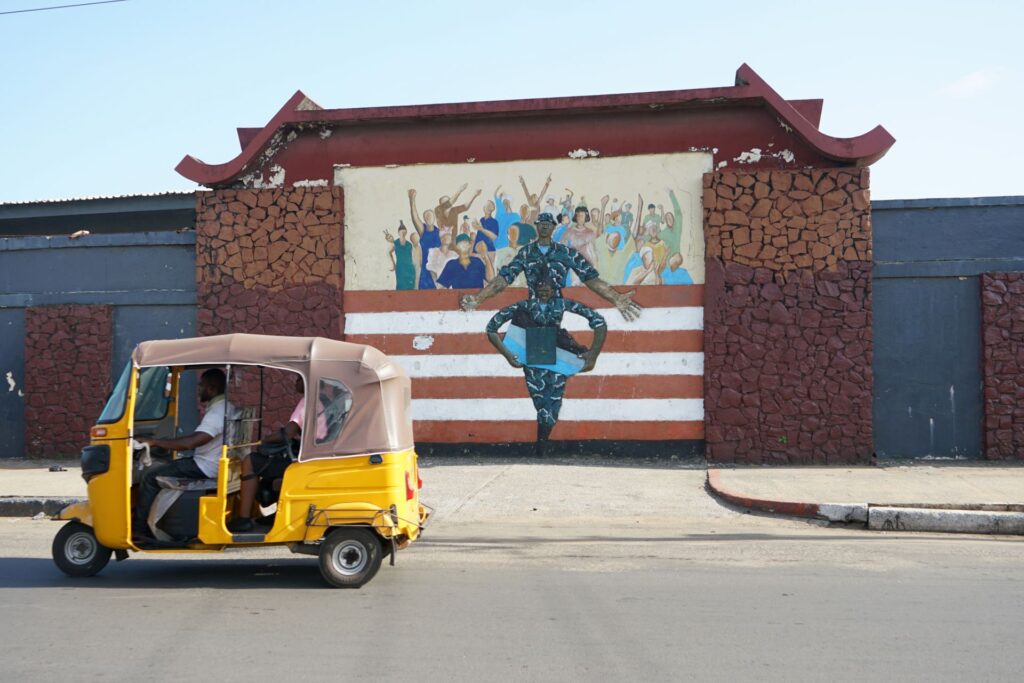
The man who led that first peacekeeping platoon was Nathaniel K. Waka, who joined the army in 2008, motivated by his wartime experiences as a civilian. “Because of what I saw, I wanted to help make a change,” he said. Three of his six siblings died of starvation during the early days of Liberia’s civil war, and as it continued, he saw friends recruited as child soldiers. At 17, he took refuge in the barracks where he now works, during a conflict known as the “April 6 War,” when thousands of civilians were rounded up in the facility as fighting erupted between warring factions.
On the drizzly day of June 26, 2013, Waka stood with his platoon of 46 soldiers in an airport hangar, flanked by U.N. shipping containers, as then-President Ellen Johnson Sirleaf and U.S. military mentors who had trained the troops shook their hands before they departed for Mali. “For so long — decades, in fact — we have been the beneficiary of support from our ECOWAS (Economic Community of West African States) neighbors, and friends from far and wide, who came to our shores to help us restore the peace and rebuild a shattered nation,” Sirleaf said. “It is time for Liberia to give back, in whatever small way that we can.”
The pomp and excitement soon gave way to harsh realities while the mission found its feet. Not long after, the Nigerian battalion of 850 troops that the Liberians were supposed to be deployed with suddenly left as the war with Boko Haram worsened and the troops were called back home.
For three months the Liberian troops were deployed in Diabaly, near the Mauritanian border, close to a Malian military base that was often attacked. “The first time I never thought I would come back,” said Waka, who would deploy years later as a military staff officer in central Mali, helping coordinate movement and operations. Soon, the Liberian platoon joined Togolese troops, helping them to secure landing zones for planes and to escort cars delivering humanitarian goods including food and medication to locals, before taking on the role of base protection at the super camp. “They were happy to see the U.N.,” he said of the local Malians.
The local needs were profound. Many Liberians who served on the mission expressed shock at the living conditions of local Malian people, particularly as the insurgency wore on and more and more people were driven from their homes. Some soldiers remarked how the harsh environment had left locals looking ravaged and aged beyond their years and that the makeshift shelters of the displaced looked like pens for animals. They also felt saddened by seeing hungry Malians. They often sent local staff home with extras from the meals they had prepared or gave out cookies and provisions they carried with them on patrols, when they still could conduct them, despite warnings not to distribute foodstuffs. Others who were deployed said later that they felt as though they were dropped into an alien land that they couldn’t engage with.
Some Liberians even questioned whether the mission was actually helping Malians. “The ordinary citizens are in poverty, and they see us living well, eating every day and some ask why we are here, what we are doing while they are starving and being attacked?” one soldier said.
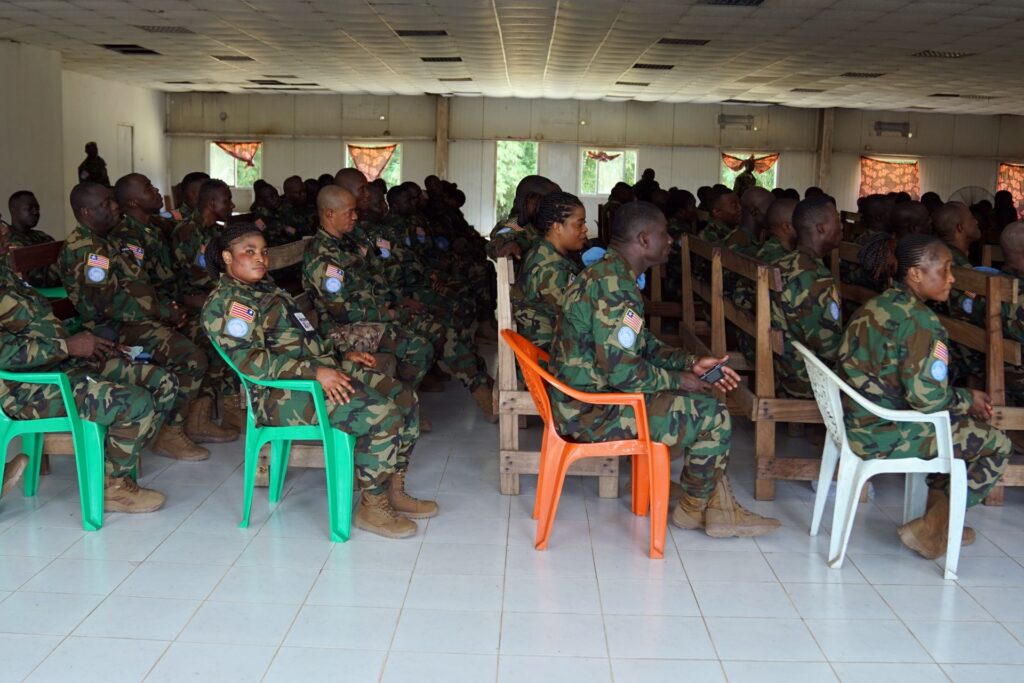
For many of the Liberian troops on the peacekeeping mission, a tour in Mali was itself a way out of economic and social precarity. Sgt. Nelson, who survived the rocket attack at the super camp in 2017, joined the military in 2008 not long after graduating from high school — a formidable feat in Liberia, a place where many struggled to make it through grade school during the conflict and its aftermath. Nelson said she had felt like a “hostage” in an unhappy relationship with the older man with whom she lived. Being from a large family with little means, Nelson wanted to be “self-sufficient,” she said, while also supporting her younger siblings to do the same.
After high school, she had enrolled in a computer course and had been earning a meager salary teaching children in an informal school. When she saw army recruiters passing around, she decided to join and specialized in logistics. While the salary for new recruits was low, it appealed to her because it was regular and allowed her to plan ahead, and possibly pursue study at university. After passing her training, she left her partner and moved into the barracks on her own. “I felt like I was no longer a woman in the house just under,” she said, meaning she was no longer subordinate to a man.
Nelson described her time in Mali as a great experience, where she picked up new skills such as detecting improvised explosive devices (IEDs) and responding to mortar attacks. Yet the harsh desert climate, the invisibility of the “enemy,” who often attacked from a distance, and the feelings of suspicion that local workers could be informants weighed on her. When their mission was extended for six months because of logistical challenges, she felt demotivated. “I was vexed,” she said.
Many of the soldiers we interviewed had been deployed for at least 18 months on what had been initially planned as a one-year mission. The delays were either for logistical reasons or, later, because of restrictions on air movement imposed by the Malian government. Some served for almost two years, with only a month and a few weeks leave. While soldiers earned as much as five times their regular monthly salary while on the mission, the additional time was hard.
“Your life is at risk. It’s stressful. Anytime you could die,” Nelson said. She missed home, missed her family. “You have the money, but you don’t have life.”
And then there was having to make a two-day overland journey on rough dirt roads when you were granted leave and could make it home.
When she did make it home, the benefits of her 18 months in Mali became apparent. Nelson used the pay she received on the mission to finish a university degree that had been dragging on because her cash flow had only allowed her to complete a few courses at a time. She started building a house, invested in a loan club, bought a small car and even traveled to the U.S. for a family visit. Nelson said most of this would not have been possible on her regular salary.
In a country where many feel let down by the lack of economic growth after the end of Liberia’s own civil war in 2003, soldiers and others have come to view peacekeeping through a development lens. Many peacekeepers, as well as senior military leadership, pointed out that money made by peacekeepers is often spent in the local economy in Liberia. Nelson explained that “the U.N. mission is, if I can say, it’s some kind of Poverty Reduction Strategy too,” referring to the project of the same name developed by then-President George Weah’s government.
A decade after Waka and that first platoon of Liberian soldiers were deployed, the challenges for the mission in Mali had grown. By 2020, the Sahel region had become a hotbed of terrorism, and peacekeepers were seen as collaborating with government forces, making them targets for violence. Roadside bombs tore through vehicles and troops while on patrol; mortar strikes or gunfire were regular occurrences. The airspace was blocked, making it nearly impossible for troops to leave after their tours were over. Wilmot Barh, a master sergeant and army chaplain, saw his comrades through some of the most difficult times on base at the super camp.
Barh had joined the military after living for seven years as a refugee in Ghana. With a passion for languages and with the help of a ministry he belonged to, he pursued studies in French and worked as a translator before returning to Liberia with his family and enrolling in the army. “I thought I would use the opportunity to come in the army to preach gospel,” he said.
When he was called for duty on the U.N. peacekeeping mission, Barh joined willingly, knowing the economic benefits from friends who had deployed before. He did three months of training, brushing up his skills in weapon maintenance and learning about IEDs, base defense and how to respond to an attack. He arrived on the mission in March 2021 and thanks to his language skills led the association of chaplains, made up of members of more than a dozen contingents that shared the super camp in Timbuktu. In addition to shifts on the tower, Barh counseled Liberian troops during one of the toughest deployments, at a time when no one knew when they were going home.
“My experience in Mali was very tough,” he said. “We experienced a lot of damages and a lot of unforeseen things. Our camp was being launched at on many occasions — attacked on many occasions.”
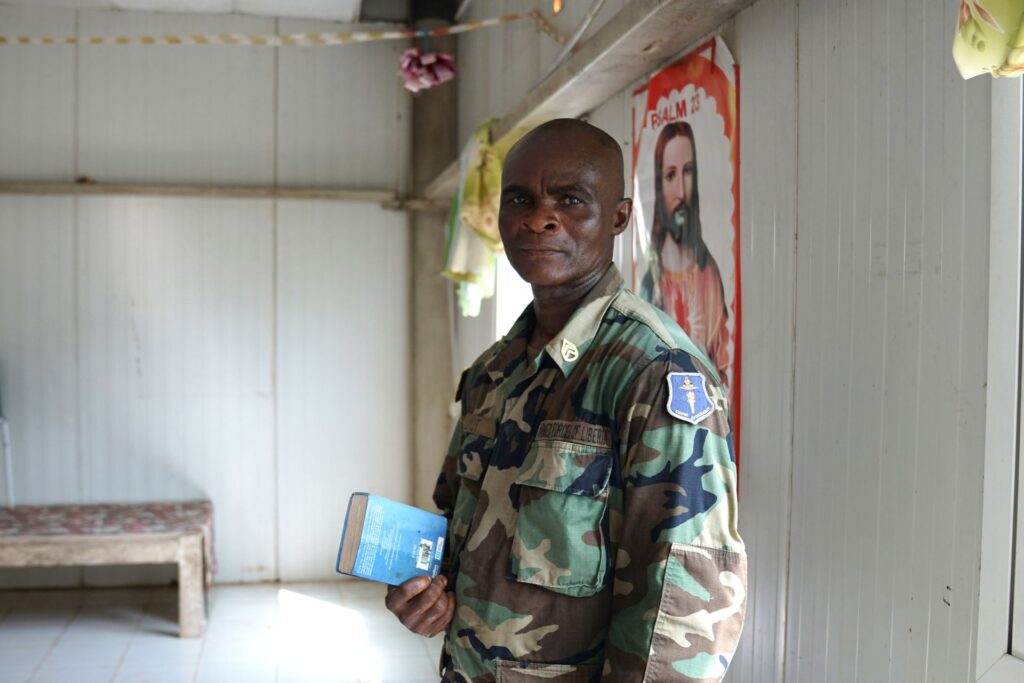
Liberia’s camp also faced the hospital manned by Nigerian medics. From the tower, troops could see soldiers who had been flown in by helicopter from other camps and those who had been wounded in the super camp. “I saw a lot of things,” he said. One day, from his post on the tower, he saw through his binoculars a man from another camp who had been killed — his head had been split open, his stomach gashed and legs cut. While Barh had fled gunfire during the war, he had never seen gunshot wounds beyond videos, and he was shaken by seeing such physical damage in the flesh.
Many Liberians remarked how lucky they were that more of their troops had not been injured, but learning about peacekeepers who had been killed by IEDs, such as the Ivorians who went on long-range patrols and the Egyptians who escorted food, sent feelings of sadness and fear through the Liberian camp.
As the months stretched on and the airspace and borders remained closed, Barh and others became frustrated, uncertain about how much longer they would be in the camp. “The day they told us we were coming back we didn’t believe it. We didn’t believe it until the date reach that we were going. We put our things on the plane, and we started believing that now we are coming back home. And we were not even convinced until we landed in our airport that we had reached home because it is possible that you would be in the air, and they attack you,” he said. Barh speaks of his time in Mali as an experience survived but that has left a mark. “To be in Mali — it is intense. Even though you can leave from there and it be well, it’s intense. And when you come home again, you can’t be 100% normal. It only today by the grace of God some of us we’re okay,” he said.
Barh said his greatest experience was leading the other chaplains, a role that has earned him dozens of connections around the world. He also built a five-bedroom house and apartments he will rent. “Right now, I in the barracks. I not worried like before because I settled, I built, I not paying rent, my family not paying rent. There is food to my house every time,” he said.
Barh is one of the many soldiers we interviewed in Liberia who saw the assignment on a peacekeeping mission as a one-time opportunity in their military career to advance their lives — build houses, buy cars, establish businesses and fund both their own education as well as those of children and siblings — in ways that would be impossible on their Liberian army salaries alone.
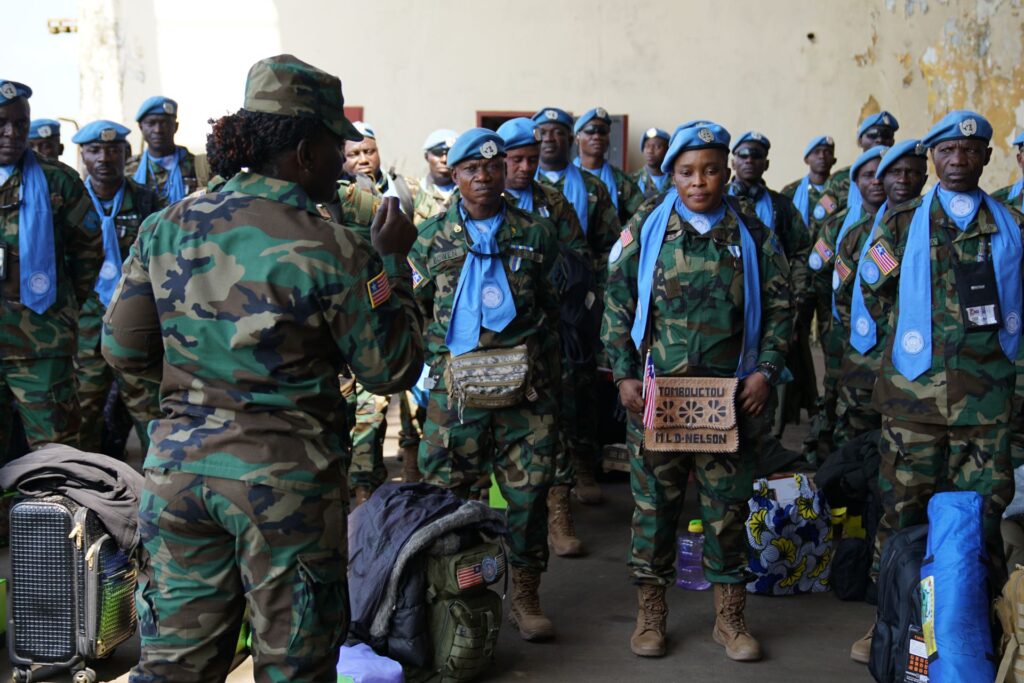
In August, concern was circulating among the former peacekeepers, both for those soldiers still stationed in Mali and for those who had so far missed out on their chance of going on the mission. The armed forces’ leaders explained that they hoped to contribute to another mission, but no future deployments have yet been confirmed. Joining a new mission is often not a straightforward process — regional neighbors Sierra Leone and Gambia have not been able to redeploy for years since their last peacekeeping missions ended. In our interviews throughout the region, military leadership expressed concern about a fall in troop morale after the end of peacekeeping deployments, a pattern Liberia may also experience. Those soldiers who have deployed worry their colleagues who have not had the chance will be demotivated.
Barh, like others, hopes Liberian troops will get a chance to deploy on another mission after Mali’s closure. “We tried our best to bring peace in Mali, but we are not in the authority to pass verdict that we remain,” he said, adding that it looked like the country was breaking apart.
In October 2023, as peacekeepers were withdrawing from a base in Kidal, dozens were wounded by roadside bombs en route to Gao, with Tuareg rebels looting and occupying their camp. It was unclear how and when Barh’s colleagues stationed in Timbuktu, where deadly clashes had also erupted, would make it back home before the Dec. 31 closure deadline. “We are praying that they will be able to come home safely,” he said.
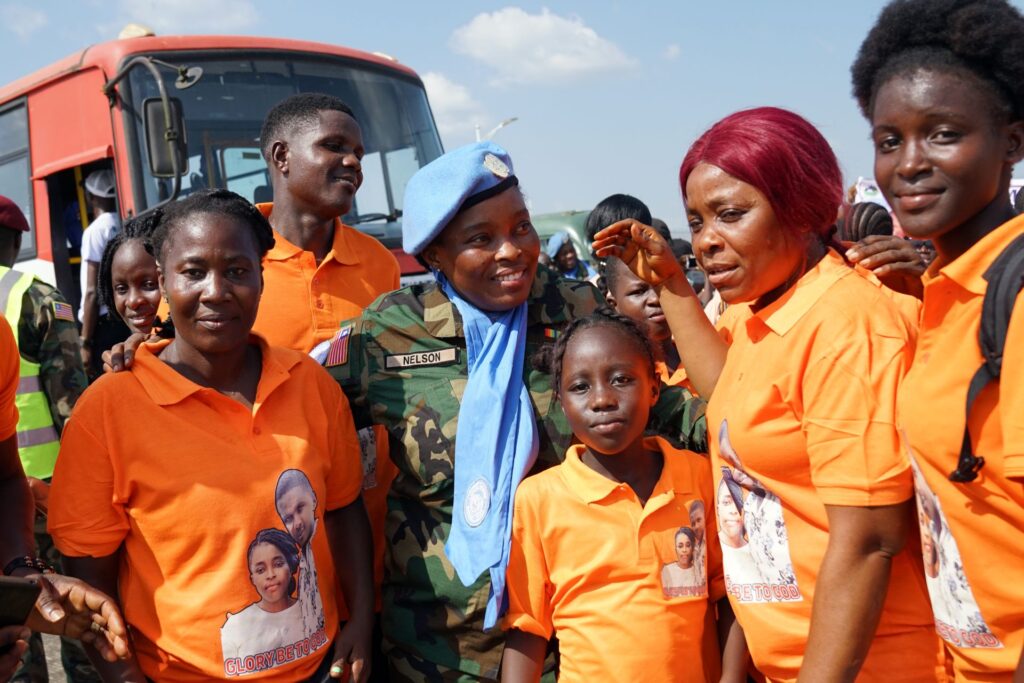
On Dec. 13, a plane full of Liberian peacekeepers touched down in the clammy tropical heat at Roberts International Airport, just outside Monrovia. Brig. Gen. Geraldine George, the deputy chief of staff, stood before them in a hangar, thanking them, outlining how they would be paid and urging them to use their money wisely. Backpacks stuffed with gifts sat at their feet, as they stood in formation wearing baby-blue U.N. berets with matching blue scarves.
Families had gathered in the parking lot, holding banners and wearing matching T-shirts with messages like “Daddy Welcome Home,” “Our Hero,” “Welcome Back My Love, My Happiness & Heart Beat.” As the bus full of soldiers approached, they cheered. Pfc. Munat London Nelson got off with a leather bag embossed with “Tomboctou” across her body and a Liberian flag in her hand. London Nelson’s family huddled around her in bright-orange polo shirts with a photo of her and her husband on them, underscored by the words “Glory Be to God” on the front and “Mummy Welcome Home” on the back. Her husband Thomas, who had also deployed in Mali in 2019, hugged her. “I’m so much happy, I’m overwhelmed, I’m out of words,” she told New Lines, adding that the mission was tough but thoughts of returning home helped. Her family had also been prepared because her husband, also a soldier, had deployed years earlier. Fifteen troops still remained to take care of the camp and remaining property. “They shouldn’t let the situation around them deter them, they should continue being focused,” she said. “It’s my prayer that they should return safely, as we also came back home safely.”
Earlier this month, the remaining 15 troops finally arrived home safely, after the base in Timbuktu was closed early because of deteriorating security. A new mission for Liberian peacekeepers is yet to be announced. London Nelson, like many of those who were deployed, hopes to go on a second mission but not before her colleagues who are still waiting for their turn.
“It’s important because we all went through the same program and they have to have experience and they also have the passion,” she said. “By the grace of God they will also benefit.”
Research for this piece was funded by the Economic and Social Research Council U.K.
Become a member today to receive access to all our paywalled essays and the best of New Lines delivered to your inbox through our newsletters.




